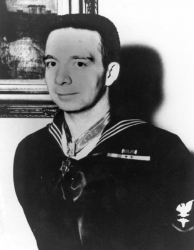
 |
|
|
||
|
William Richard Charette |
||||
|
Engagements: • Korean War (1950 - 1953) |
||||
| Biography: | ||||
|
William Richard Charette William Richard Charette was born on 29 March 1932 in Ludington, MI. His parents died when he was four years old and he was raised by an uncle. After high school, he took a job on a Lake Michigan ferryboat, which led him to join the Navy. There was a shortage of medical corpsmen, so he volunteered. He worked in a Navy hospital for a year and then volunteered again; this time as a medic with the U.S. Marine Corps. He was assigned to a rifle company in the Seventh Marines in Korea. In the spring of 1953, Navy Corpsman Charette's Marine unit was in an area near Panmunjom between North and South Korea, guarding the route to the South Korean capital of Seoul. In the early-morning hours of 27 March 1953, Chinese troops overran three outposts on a hill the Americans called Vegas. Several hours later, the Marines counterattacked to retake the position. It was the beginning of twenty-four hours of non-stop combat. The well-entrenched enemy hit the Americans with small arms and mortar fire. As the Marines tried to ascend Vegas Hill, the Chinese rolled grenades down on them. There were so many explosions that Charette couldn't keep count. At one point, he was working on a badly wounded rifleman when a Chinese grenade hit nearby. Figuring that the man couldn't survive another wound, Charette threw himself over his body. The explosion tore off Charette's helmet, destroyed his medical pack, and knocked him out. When he came to and couldn't see because of the blood in his eyes (caused by shrapnel wounds to his face), he thought he was blind. But his vision eventually cleared, and he returned to his duties. Charette's medical supplies were destroyed by enemy fire, but he improvised by tearing off pieces of his uniform to make bandages for the men in his unit as well as for those in nearby platoons. He put his own battle vest on a wounded Marine whose vest had been destroyed by an explosion. When a trench was completely blown out, he swiftly went to the aid of five soldiers wounded in the explosion. One of them was severely injured, his leg nearly severed. When the order came at dawn to pull back, Marines started carrying the wounded out. They had to bend down to avoid enemy fire and were unable to get the man with the nearly-severed leg out without injuring him further. Charette picked the Marine up in his arms and, standing up despite enemy guns, carried him to safety. Following this engagement, Charette was pulled back in reserve. He was recommended for the Navy Cross, but as the citation was forwarded up through the ranks, it was upgraded to the Medal of Honor. In all, five Navy corpsmen were recommended for the medal during the Korean War. Charette was the only one who survived to receive it. On 12 January 1954, William Charette received the Medal of Honor from President Dwight Eisenhower. The man who explained the protocol for the ceremony to him, submarine commander Captain Edward L. Beach, Jr., the president's naval aide, went on to write the best-selling Run Silent, Run Deep. Years later Charette served under Beach's command on board the USS Triton (SSN-586). Charette served as an Independent Duty Corpsmen (IDC) in the Navy's Nuclear Submarine Program. Charette continued to advance and eventually retired in 1977 after serving 26 years at the highest Navy enlisted rank (E-9) Master Chief Hospital Corpsman, Submarines - HMCM(SS). In 1958, as the U.S. Navy's only active-duty Medal of Honor recipient, Hospital Corpsman First Class Charette had the honor of selecting the Unknown Soldier of World War II. Two unknowns from World War II, one from the European Theater and one from the Pacific Theater, were placed in identical caskets and taken aboard the USS Canberra, a guided-missile cruiser resting off the Virginia capes. After HM1 Charette made his selection, the remaining casket received a solemn burial at sea. Medal of Honor Rank and organization: Hospital Corpsman Third Class, U.S. Navy, Medical Corpsman serving with a marine rifle company. Place and date: Korea, 27 March 1953 Citation: Charette was also awarded the Purple Heart. Death and Burial Master Chief Petty Officer William Richard Charette died on 18 March 2012 and is buried at Florida National Cemetery, Bushell, FL. http://www.findagrave.com/cgi-bin/fg.cgi?page=gr&GRid=87191368 |
||||
| Honoree ID: 1139 | Created by: MHOH | |||
Ribbons
Medals
Badges
Honoree Photos
 |  |  |
 |  |
 |


